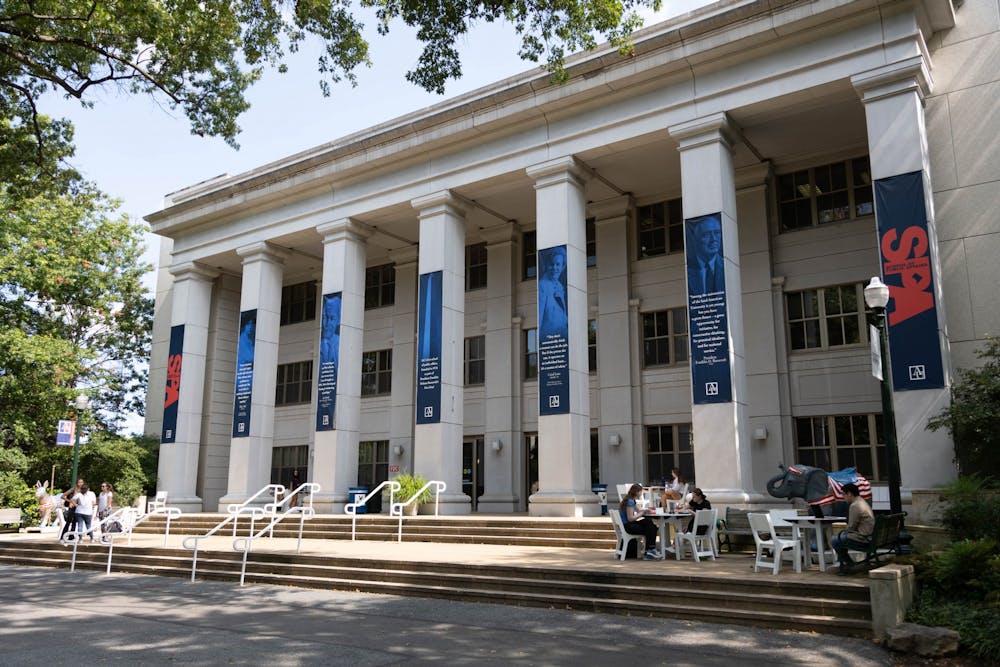A Columbia University linguistics professor discussed his dissent towards anti-racism as practiced today in a conversation for the American University Political Theory Institute’s final installment of its fall 2022 lecture series on Dec. 5.
Columbia University associate professor John McWhorter writes a weekly newsletter for The New York Times and hosts the linguistics podcast “Lexicon Valley.” He has published articles in The Atlantic and has written over 20 books covering linguistics and anti-racism in the United States.
Throughout the conversation, McWhorter said he believed past systems of racism have led to several of the disadvantages Black Americans face today, but that he disagreed with the conversation around how to address and talk about these issues.
He described three waves of anti-racism: the fight to end legal segregation, the national reckoning with implicit biases and the present focus on understanding white privilege as a prerequisite for progress. He said he is significantly concerned about the present movement of anti-racism.
“And this is the problem: the presumption is that we have to have that conversation and white people must have this realization before there can be any real change in terms of what race means in this society,” McWhorter said. “That's a very different thing from what Martin Luther King [Jr.] meant.”
McWhorter said he views modern anti-racism as a religion.
“In many religions, there is a point at which you're expected to let logic go and just believe,” he said. “You're supposed to subscribe to an alternate realm. And I think that that's also true with modern anti-racism, in that there are questions that you're not supposed to ask and that you're expected to allow things to not make strict sense.”
McWhorter also said such an approach to anti-racism causes harm and prevents true progress in helping Black Americans. He used gun violence as an example, saying that simply calling the disproportionate amount of violence in Black neighborhoods “racism” is not productive.
There are three steps he believes will help rectify the injustices facing Black America today. He explained the importance of ending the war on drugs, teaching children to read using phonics to sound out words — as opposed to teaching them to recognize full words — and providing more opportunities for vocational education outside of a college or university.
“So those three things are things that I would do if I could wave a magic wand because I'm concerned with Black America having fewer problems,” McWhorter said. “But what I would not do is insist that white Americans must engage in this ‘kumbaya circle’ and think about the work that they have to do to understand their inner racist. I simply don't see how that's a necessary prelude to the three things that I talked about.”
He also spoke on the importance of Black individualism and the ability for Black people to pursue interests beyond those which involve racial issues. When white America began to listen to the Black American experience in the 1960s, many Black people defaulted to considering their race-related struggles their most important quality or experience, McWhorter said.
“So if you have this situation where whites want to hear you out — and there's a very weak sense of what we would now call Black pride in many people — then naturally one way that you feel whole is to adopt the kind of victim complex,” he said.
McWhorter said he encourages Black Americans to explore interests beyond those related to race, saying the societal expectation for Black people to speak about race hinders them from further exploring their own unique interests.
“I wish there were more Black writers of nonfiction, who would write things that had nothing to do with race,” he said. “We can write about race, I do it. But what about something else? … There needs to be more; we can do more. It's our humanity to do more.”
As the conversation drew to a close, McWhorter answered questions from audience members. When asked about how universities should address racism, he said he believes they should include a wide range of views on the topic in their courses.
“There should be a rich curriculum on race that represents what a wide range of people think, especially because the sorts of things that I’m expressing, for example, are very easy to find among many groups of Black people living in the real world,” he said.
McWhorter said students should think critically and speak out about the national conversation on race, adding that they should think about their initial reactions to discussions of race and share these reactions, even if they believe they may face some backlash.
“If your response to something that you heard is fear — inside, you have an answer, but you think you’re not supposed to say anything or you’re not supposed to think anything because you’re afraid — listen to that and think what you’re thinking and consider saying it.”





